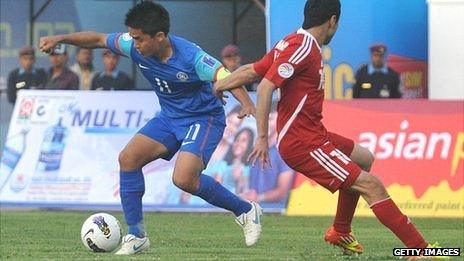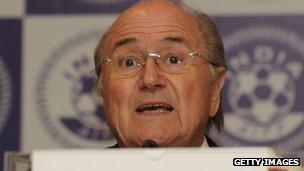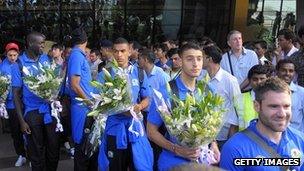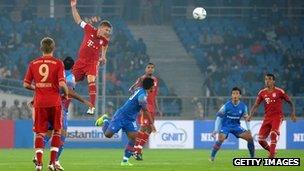Football looks to score in India
- Published

Indian footballer Sunil Chhetri (left) in action against Tajikistan in March
When India qualified for the 1950 World Cup in Brazil they refused to participate - partly because it would have meant their normally bare foot team having to wear football boots.
More than 60 years on, with another World Cup looming in Brazil and the Indian economy booming, there are renewed hopes that football can finally gain a toehold in the cricket-loving country.
Qualification for the 2014 World Cup may be a step too far, but there are a number of initiatives under way to boost the sport.
The challenges are to nurture that growing interest while wooing fans away from watching overseas football on TV, and the need to create a strong national league and international team.
Off the pitch there is the need to build football industry and infrastructure, while boosting the expertise of administrators and coaching and other backroom staff.
'Development programmes'
"There is a challenge from cricket, which gets the most investment," admits Kushal Das, general secretary of the All India Football Federation (AIFF).

On a recent trip to India Sepp Blatter said the country could host the Under-17 World Cup
"Many youngsters though are now watching a lot of football, mainly European leagues.
"We need to develop interest in the Indian leagues, and we need development programmes for that."
Mr Das said he was encouraged by the recent visit of Fifa president Sepp Blatter to the country.
The country is hoping to host the Under-17 World Cup in 2017, and Mr Blatter has so far offered encouraging noises.
Mr Das said that highlights over the past couple of years included India playing in the AFC Asian Cup in 2011 for the first time in more than 20 years, and the 15-year commercial and marketing partnership between the AIFF and IMG-Reliance.
Encouragement has also come from a recent development plan for football in India drawn up with Fifa.
"We are starting up academies for player development in four cities by July and another four by July 2013, for different age groups," says Mr Das.
A technical director has also been appointed for the first time, unusual as it may seem that such a role did not exist before.
"We are looking not just at player development, but also administration, education, referees," says Mr Das.
"If we are successful in hosting the Under-17 there will be [business] opportunities, to participate in the whole development of Indian football - it is a great opportunity."
He adds: "The biggest challenge is infrastructure. I hope, if we have the World Cup hosting rights, that there will be serious efforts to improve the infrastructure."
'Tremendously popular'
IMG and stadium builders Populous have already been around the country looking at which existing stadiums could potentially be brought up to scratch for 2017.
One of the footballing hotbeds in the country is Pune, a city in the west of the country with a three million-plus population.

Blackburn Rovers plans to open more training academies in India
"Sport, including football, is tremendously popular among the youth of our city today," says Vishwajeet Kadam, president of Pune District Football Association.
"We don't only focus on the skills development of players. We also taking to the FA and taking advice from the Indian Premier League cricket, and hockey, about ways to boost the football industry and surrounding football industry skills."
Pune also has contacts with English Premier League football clubs, including Liverpool and Blackburn Rovers, who both have training academies in the city.
"Other clubs have been to India to just hold training sessions, but Liverpool has shown a clear commitment," says Mr Kadam.
"Most European clubs seriously underestimate the Indian market.
"There are organisations in India ready to spend money in partnerships with European clubs."
One club which has formed a partnership is Italian side Inter Milan, which has entered a joint football venture with Tata Tea to support a youth football tournament in India, covering 15 cities, 1,000 schools, and one million children.
Mario de Vivo, Inter Milan chief commercial officer, adds: "We then select 16 young Indian pupils and take them to Inter Milan training academy for three days.
"We are bringing to India not only technical skills, but also medical, nutritional, and psychological support.
"We are able to offer a complete platform to help young teams, federations, and other people that want to learn about football and improve the professional side."
'Sporting culture'
Business bodies in India also wants to improve transparency, accountability, marketing, planning and professionalism in football.
Rajpal Singh of the Federation of Indian Chambers of Commerce & Industry (Ficci) says: "We realise in sport we need foreign expertise.

Bayern Munich in action in an exhibition game against India in January
"We want to create a sporting culture in India, and bring about attitudinal change and develop a sporting infrastructure.
"India is a cricket country but over the past two years you can see a change in attitude. Sports people are now looking towards football.
"But we need to examine the whole football infrastructure."
IMG-Reliance is bringing its sports industry expertise to India as part of its deal with the AIFF.
"Indians love football and can play football. If you buy into that premise then you know we will be successful," says IMG's Jefferson Slack.
Mr Slack admits there are challenges on the football and infrastructure side, but says there is a competitive media market in India that is "going to need high quality football content".
He adds: "There are certainly some challenges. The existing league suffers from an… organisation standpoint.
"The IPL [cricket] was instructive because it showed that a properly constructed franchise league could work.
"There is a lot of money in India to build a brand. Football needs to succeed. It needs a plan. We are are not there yet.
"But the long term view we have is that this will be lucrative."
'Star driven'
Meanwhile, uncertainty remains about the future of the proposed, but currently delayed, Premier Soccer League (PLS) in West Bengal.
The PLS was intended as a state league for older European players - such as Robert Pires and Fabio Cannavaro. It attracted publicity around the world, particularly in the UK.
Mr Slack said he understood the premise of the league as, he says, India is a country that is "star driven".
But he said there was a pressing need to boost the status of the current Indian national soccer league.
"We are in dialogue with I-League about how to make the league more competitive and attractive," he says.
"There are no easy solutions there. We completely understand that the clubs need to get more out of it."